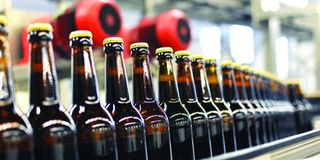Make beer affordable to stop killer brews

Beer bottles on the assembly line in a modern brewery.
In 2015, the state launched a campaign against illicit liquor in central Kenya. Although police raided several dens and arrested some suspects, the campaign flopped. To many, this failure did not come as a surprise because it was clear from the beginning that the government did not have a good strategy and did not fully understand the problem.
The government assumed that closing illicit liquor dens and arresting people [was the] magic [bullet] that would stop locals from imbibing killer brews. This was too much to expect under any circumstance especially given the level of corruption in the law enforcement department.
Anybody who understands the alcohol crisis in central Kenya will admit that it’s largely tied to graft. This means that any strategy that involves the forceful closure of liquor dens can’t work unless corruption is tackled. It will be naive to think that corruption is going anywhere, anytime soon, because it’s now part of our culture. However, all is not lost. We can still deal with this crisis in a different way.
For many years, we’ve been made to believe that the people of central Kenya are the only ones drinking themselves silly. Well, the truth is that the alcohol crisis is felt in almost every part of the country save for the drought-stricken areas.
Crisis
We have also been made to think that the crisis is driven by over-consumption of alcohol. For the record, the problem is caused by the quality and not the quantity of alcohol consumed.
Drinking too much alcohol has no potential of creating a crisis. The British and Dutch people consume more beer per person compared to Kenyans, but there has never been a drinking crisis in these countries. This is because genuine beer in these two countries is affordable such that even the poor can afford it.
I was shocked the other day to learn that alcohol in the Netherlands costs almost the same price as bottled water. In other words, if you can afford water, you can afford beer. This means it’s almost impossible to contemplate selling illicit liquor in these countries.
Tax on beer
It is, therefore, safe to conclude that the only way we can successfully deal with the alcohol crisis in central Kenya is by zero-rating the tax on beer. The aim is to match the price of beer with that of illicit brew. The moment this is achieved, we will have successfully eliminated the need for people to take dangerous illicit brew, because the popularity of illicit liquor is tied to its affordability.
If well implemented, this strategy can kick Kumikumi dealers out of business within six months. Dealers will literally and willingly close their dens due to scarcity of customers. This strategy has been tried and tested in the UK and the Netherlands and there is no reason why we can’t implement it here.
The implementation of this solution will no doubt have a negative impact on the taxes collected by Kenya Revenue Authority, but the negative effect will be short-lived since more youths from central Kenya will become economically active and this will help generate jobs and revenues.
Chumaari Muya, Radboud University




